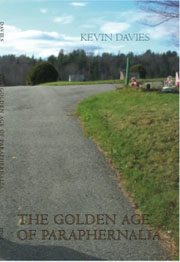by Steven Zultanski
Kevin Davies has trafficked in disruptive formal entanglement for three volumes now. He’s a virtuoso of white space, using the blank page to punctuate convolutions of thought and utterance. Often this is a part of the poems’ humor, but just as often it’s a way to make connections between lines precisely by bringing to the fore the distance between them. Instead of the mental leap that a reader must make between lines in a poem that may be linguistically disjunctive but nonetheless left justified, Davies’s poems literally leap across the page. However, this leaping is not an element of expressivity, and Davies never stoops to merely fashioning a pretty shape—his forms are taut constructions that work to continually subvert the meaning of any given line.
For example, in the middle of a seemingly untitled section of his new book, The Golden Age of Paraphernalia, we get this constellation:
lakes ● Mansion,
yacht, and high-powered friends.
Remarks are literature. ● Excellent, scholarly
bartenders
On the page, the sparseness of these lines is followed by another short series of “remarks,” which shifts altogether the direction of the poem—each stanza is altered by the next, and by the generous blank space between them. While the effect is admittedly somewhat lost now that the above stanza is surrounded by chunky prose instead of cascading into another tightly wound miniature, we can still get the picture: associations are contorted through a highly wrought machinery. The word “lakes” is followed by a dot and the beginning of a new sentence, and is thus both associated and disassociated from the mansion. On the one hand, the lakes are private lakes, the view from the window of a wealthy person with “high-powered friends.” On the other hand, few people actually own lakes, and even the wealthy homeowner probably looks out onto someone else’s lake—or onto the state’s lake. Lakes are just as likely as anything else to be caught up in the circuit of commodities, but they also may function as a remainder of public property in the massive grid of private property. The next line, “Remarks are literature,” works as a kind of ars poetica, given that Davies’s poems often feel like a series of remarks, skillfully arranged to become more than remarks, but without losing their status as overheard statements and quotidian comedy. Finally, “Excellent, scholarly / bartenders” is a perfect example of the system of inversion at work in this book. So often, an image or a statement is flipped on its head by the line break, and ultimately the poems begin to feel like a series of somersaults.
The centerpiece of this collection is a long poem entitled “Lateral Argument.” Here Davies doesn’t construct small stanzas on mostly empty pages, but instead runs the lines from top to bottom, in a variety of shifting stanzaic forms, in order to craft a dizzying lyric from an array of personal, ironic, and politicized statements. “Lateral Argument” concludes:
Most of the crops look bad, the reservoirs are severely
depleted, and a huge browncloud hangs over south Asia.
The very fact that you are writinga string quartet is itself an argument.
I then witnessed my own liver being roasted.
The tone is largely ironic, but not completely. It’s clear that the writing of a string quartet, as an aesthetic argument or political act, is laughable in the context of drought and the “huge brown cloud” that ominously looms over Asia. Even though Davies’s work can often read like a concentration of discursive formations, its argument, in the end, is not simply about discourse. The place of the poet is not within an ongoing aesthetic conversation somehow transcendent of material reality. Instead Davies treats the poet as a composer already caught up in the most dangerous currents of the contemporary: the policing of the physical body and the all-pervasiveness of dominant ideologies. It seems at first to be discursive critique, to be undermining our forms of speech. However, Davies’s work does so only to the extent that those forms of speech construct our understanding of the world, and of the “huge brown cloud.”
Thus the digressions and thwarted clichés that litter these poems are comic, but in a profound sense—they are also a political argument, a way of inverting the familiar or expected and uncovering the strange and/or uncomfortable truth. The Golden Age of Paraphernalia is not about overturning expectations, per se, but about the form of overturning itself. The gaps between lines and clever reversals are part of an optimistic, almost utopian attempt to untie ideological knots and rewrite the present in terms that are funny, true, and always mournfully aware of the impossibility of the task.
Click here to purchase this book at your local independent bookstore

Rain Taxi Online Edition, Winter 2008/2009 | © Rain Taxi, Inc. 2008/2009

